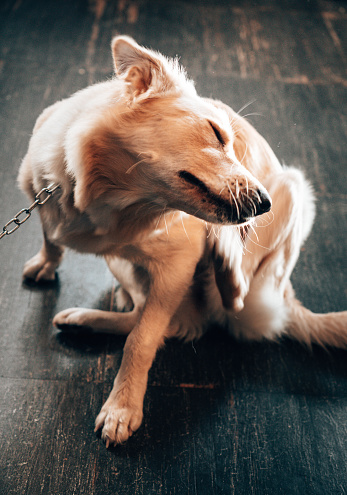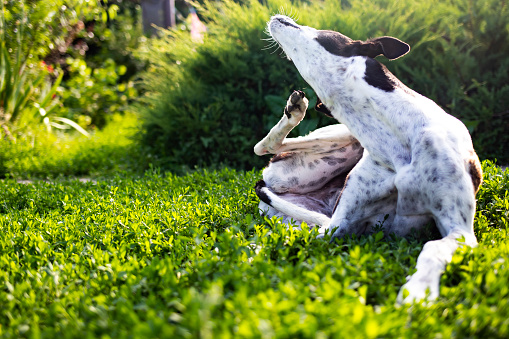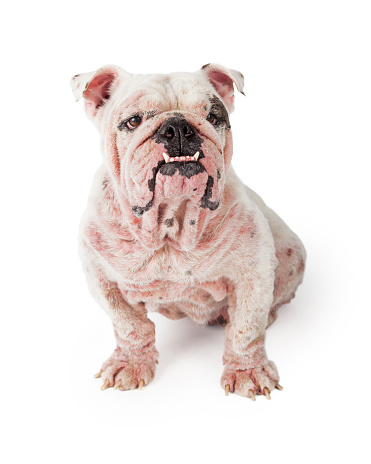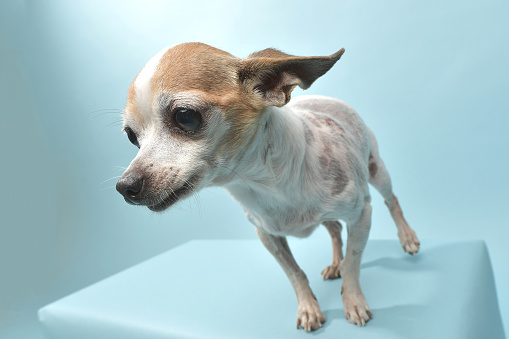Why your dog has dry skin is a frustrating issue for dogs and owners alike. We can’t stand to watch our dogs suffer, they can’t find relief from their itchy skin, and we don’t want to listen to the constant tag-jingling, licking, and scratching. If dry, irritated, or flaky skin is making your dog uncomfortable, here is what you need to know about the causes, symptoms, and treatment when your dog has dry skin.

Why Does Your Dog Have Dry Skin?
Dry skin might not seem like a big deal, but the underlying condition causing your dog’s dry skin might speak to bigger health issues. Irritated, itchy skin can be a symptom of a wide variety of health issues, from food allergies to parasites and more. Here are some of the most reasons your dog has dry skin.
Allergies
Dogs get allergies just like people do. The allergy could be to something your dog has eaten, something in their environment, or something they have breathed in. Allergies can affect dogs of all ages, but you’ll usually see them in younger dogs under 3 years of age. Here are a few common allergies your dog might have:
- Outdoor grasses, weeds, pollen, pesticides
- Indoor carpet cleaners, shampoo, soap, carpets
- Dog Food
- Fleas or other pests
If left untreated, the dry skin caused by an allergic reaction can lead to dry, itchy skin, redness, inflammation, and eventually, skin infections. Flea allergy dermatitis is an allergic reaction to flea saliva and is the most common skin issue in dogs. Keep your dog flea-free with natural treatments, flea collars, etc. to ensure your dog avoids an allergic reaction.

Parasites
There are several parasites that can be the reason why your dog has dry skin. Parasitic infestations should be diagnosed by a licensed veterinarian. If you suspect your dog has dry skin due to parasites, take them to see a vet as soon as possible.
Mange
Mange isn’t the name of a parasite, but a skin issue caused by a group of parasites. The most common types are:
- Sarcoptic Mange, aka canine scabies, caused by Sarcoptes scabiei
- Otodectic mange, most often occurring in and around the ears, caused by Otodectes cynotis
- Cherletiellosis, aka Walking Dandruff, caused by Cheyletiella yasguri
- Canine demodicosis, caused by Demodex canis mites that inhabit hair follicles and sebaceous glands.
- Trombiculosis, a common seasonal skin issue caused by the larval stage of mites in the Trombiculidae family, aka chiggers

Skin Infections
A skin infection could be why your dog has dry skin. Both bacterial and fungal infections can cause an entire slew of skin infections, which are often a secondary issue to a larger problem. Some skin infections, such as ringworm, are transmissible to humans. If you suspect your dog has a bacterial or fungal skin infection, take them to a vet immediately and they will likely take a skin scraping for diagnostic purposes.
Disorders
There are two main diseases associated with dry skin in dogs. These diseases are systemic and dry skin is only a slight symptom of a larger problem. The two diseases are Cushing’s Disease and Hypothyroidism.

Cushing’s Disease
Cushing’s Disease, or Cushing’s Syndrome, is more formally known as Hyperadrenocorticism. This disease refers to elevated cortisol concentrations. Most often, elevated cortisol is caused by an overactive pituitary gland. This is sometimes caused by a tumor on the gland. The clinical signs of Cushing’s Disease are weight gain, alopecia (hair loss), muscle atrophy, and a pot-bellied appearance.
Hypothyroidism
Hypothyroidism is a clinical condition where the thyroid gland does not produce adequate hormone levels. It is characterized by an overall decrease in cellular metabolic activity. Symptoms include weight gain, lethargy, dull coats with more shedding, and hair loss. They may also suffer chronic skin infections.

Other Reasons Your Dog Has Dry Skin
If your dog does not have any of the issues or disorders listed above, there could be less sinister reasons your dog has dry skin. Environmental conditions like dry air or cold weather can cause dry skin. Excessive bathing or harsh shampoos can also cause skin irritation in dogs. Finally, poor nutrition can lead to irritated skin and dull, lifeless coats. It’s always a good idea to have your vet rule out more serious diseases, but they may suggest one of the above issues causing your dog’s dry skin.
Symptoms of Dry Skin
Whatever the reason your dog has dry skin, it’s essential to recognize the signs and symptoms; this is the first step towards getting your dog back to their happy itch-free selves. Here are common symptoms of dry skin:
- Itchiness
- Increased oil
- Flaking/dandruff
- Redness
- Inflammation
- Pimples
- Hair Loss
- Odor
- Scabs

How To Treat and Prevent Dry Skin
Because dry skin has so many potential causes, the first step to treating or preventing a recurrence of your dog’s dry skin is to diagnose the problem. More often than not, you will need to take your dog to a licensed vet for proper diagnosis. In the event your dog’s skin issues are allergy-related, you can minimize contact with the allergen. If it’s food-related, you can feed a higher quality diet with better nutrients. Prevent irritating parasites by using the proper preventative methods for pests like fleas, ticks, etc.
We all love our pups and want nothing more than for them to be comfortable in their own skin, literally. With vigilance and regular vet check-ups, we can ensure our dogs are happy, healthy, and itch-free.
